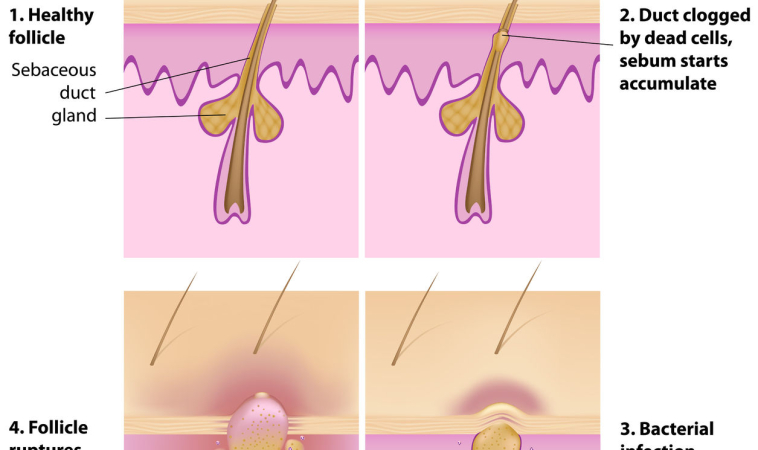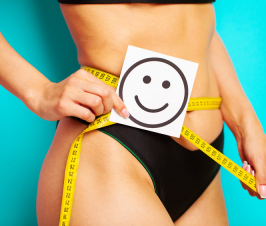Treating Acne is No Easy Task
Often, many issues must be addressed over many months. But remember that the body does want to be beautiful and healthy – all we need to do is give it the proper tools to thrive.
Following are a few of my favorite anti-acne tips:
1. Do not eat dairy – Everybody balks when I cut dairy out of their diets. They simply cannot imagine life without milk, yogurt, cheese, and ice cream. But there is a direct, scientific reason why dairy causes acne. Cows contain a hormone that is very similar in molecular structure to our own IGF-1 (Insulin-like growth factor) hormone. Sadly, this IGF-1 has receptors on our sebum glands in the skin, and the bovine hormone fits right in the receptor. So this means as soon as you eat dairy, the body is being sent a direct message to increase oil production in the skin. Bad idea for acne sufferers.
2. Balance your blood sugar – In the early part of the twentieth century, acne was aptly called ‘Diabetes of the Skin’. Subsequent scientific studies have found that acne sufferers are more sensitive to blood sugar imbalances than non-acne sufferers. This means the following: eat three meals a day (and a few snacks if needed), avoid simple carbohydrates and include a small amount of protein in each snack and meal. Lots of fresh vegetables and cut way down on any type of sugar.
3. Support your liver – A properly functioning liver is necessary to detoxify the body and manage hormone levels (which we will discuss in a moment). Most people that suffer from acne have a sluggish liver, but luckily there are some beautiful herbs that help the liver perform optimally. Milk thistle and dandelion are two of the herbs that are most commonly used, but there are many other herbs and herbal combinations that work beautifully.
4. Have regular bowel movements – When the bowels are not moving daily, excess hormones and toxins continue to circulate in the body, often affecting the skin. Regular bowel movements are essential to hormone balance.
5. Improve your Digestion – There is a huge connection between the skin and the gut. In fact, I always start skin treatments (for acne, eczema, psoriasis, rashes, etc.) by taking a look at digestion. If you experience bloating, gas, IBS, or any type of gastric dysfunction – get a thorough evaluation from a naturopathic doctor. Remedies often include eliminating food sensitivities, probiotics, and gut healing herbs.
6. Relax– The bad news first: studies have shown that acne sufferers are more sensitive to stress. High levels of the stress hormone cortisol contribute to insulin dysregulation and imbalanced blood sugar, which leads directly to acne (remember that acne has been called ‘Diabetes of the Skin’). In addition, when exposed to stress acne sufferers produce high levels of a neuropeptide called Substance P, which acts directly on the oil glands of the skin to produce more oil, and thus more acne. The good news: all you have to do is relax. Easier said than done, but you can make it fun! Do something you love to do…
7. Check your hormones – After you have completed steps 1-6 for at least a month, get your hormones checked. Simply following the tips above will help normalize your hormones somewhat, but a little extra help is often needed. I perform either salivary or blood tests on my patients, and prescribe herbs based on the results. Everybody is a little different, and I definitely do not want to mess with the hormones without hormone testing. After a few months of hormone treatment, the acne should improve. And you will feel better in general. Win-win.
8. Use a Manuka Honey Mask – This is my personal favorite treatment. I smear a little raw manuka honey on my face for 5 minutes after I cleanse both morning and night. Raw honey has anti-bacterial properties against over 60 different types of bacteria – and manuka honey has almost double the anti-bacterial action of regular raw honey due to its high levels of methylglyoxal. In addition, honey is a humectant, which means it absorbs moisture from the air – leaving your skin clear and moist. Simply beautiful.
9. Use a Peel (but not if you are using a retinoid)– Acneic skin often has a reduced ability to naturally exfoliate, which means peels are essential to keep the pores of the skin open and clear (otherwise dead skin cells tend to clog the pores and contribute to the formation of acne). There are many types of peels out there, but I find that using a combination peel of Alpha AND Beta Hydroxy Acids on a weekly basis helps acne tremendously. The alpha hydroxyl acids (sometimes referred to as glycolic acid) helps to exfoliate surface cells, while beta hydroxyl acids penetrate the pores to help to clean deeply.
10. Use a Topical Retinoid – Retinoids are often frowned upon by the naturopathic community, but the bottom line is that they are the only skin care treatment that has been scientifically proven to reduce acne and aging at the same time. And they are also pretty natural (with the exception of synthentic retinoids such as adapalene, tarazotine, and isotretinoin). Retinol is the form of vitamin A found in nature, and it is also the form of retinoid found in most over-the-counter treatments. Retinol is converted into its active form, retinoic acid, in the body. Retinoic acid binds to retinoic acid receptors in the skin and normalizes desquamation (exfoliation) and increases collagen production. When used consistently, retinoids can keep your skin clear, even out skin tone, repair sun damage, and prevent pre-mature aging. This skin-changing factor, along with other exfoliating and anti-inflammatory properties, make retinoids the gold standard for acne and anti-aging treatments.
 Stacey Shillington, ND graduated from the Canadian College of Naturopathic Medicine (Toronto, Ontario, Canada) in 2006. She has since established a practice in downtown Toronto focusing on naturopathic anti-aging and skin care, including mesotherapy and cosmetic acupuncture.
Stacey Shillington, ND graduated from the Canadian College of Naturopathic Medicine (Toronto, Ontario, Canada) in 2006. She has since established a practice in downtown Toronto focusing on naturopathic anti-aging and skin care, including mesotherapy and cosmetic acupuncture.


















What to do for chronic sinusitis with post nasal drip and coughing.
#1 is not true in my experience, when I switched to raw organic dairy (I don’t live in Canada, I know it’s harder to get there, but there are cow shares), 100% organic animal products and about 80-90% organic plants I stopped getting acne. But if I do consume something non-organic, especially animal products, I can break out like crazy.
I love your advice to balance sugar levels. It seem that people don’t realize it, but eating a lot of sugar can really set you back when it comes to keeping your skin in good condition. Do you have any other tips about keeping your skin healthy naturally? I heard that dark chocolate works, but I’m not sure how it all works.